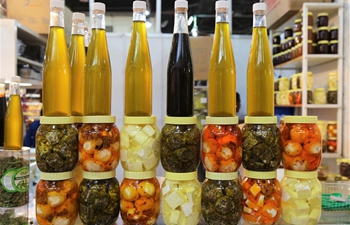WASHINGTON, April 16 (Xinhua) -- Scientists have engineered an enzyme which can digest some of the most commonly polluting plastics, providing a potential solution to one of the world's biggest environmental problems.
A study, published on Monday in Proceedings of the National Academy of Sciences, may result in a recycling solution to millions of tonnes of plastic bottles, made of polyethylene terephthalate, or PET, which currently persists for hundreds of years in the environment.
Professor John McGeehan at the University of Portsmouth and Dr Gregg Beckham at the United States Department of Energy's National Renewable Energy Laboratory (NREL) solved the crystal structure of PETase, a recently discovered enzyme that digests PET.
They used this 3D information to understand how it works, and during this study, they inadvertently engineered an enzyme that is even better at degrading the plastics than the one that evolved in nature.
The team initially discovered that PETase has some unusual features including a more open active site, able to accommodate man-made rather than natural polymers. The trait indicated that PETase may have evolved in a PET-containing environment to enable the enzyme to degrade PET.
To test that hypothesis, the researchers mutated the PETase active site to make it more like a cutinase and they found that the PETase mutant was better than the natural PETase in degrading PET.
"Although the improvement is modest, this unanticipated discovery suggests that there is room to further improve these enzymes, moving us closer to a recycling solution for the ever-growing mountain of discarded plastics," McGeehan said.
The researchers are now working with the tools of protein engineering and evolution to improve the enzyme in order to allow it to be used industrially to break down plastics in a fraction of the time.
The mutant enzyme can also degrade polyethylene furandicarboxylate, or PEF, a bio-based substitute for PET plastics that is being hailed as a replacement for glass beer bottles.
"The engineering process is much the same as for enzymes currently being used in bio-washing detergents and in the manufacture of biofuels," said McGeehan.
"The technology exists and it's well within the possibility that in the coming years we will see an industrially viable process to turn PET and potentially other substrates like PEF, PLA, and PBS, back into their original building blocks so that they can be sustainably recycled," said McGeehan.

















